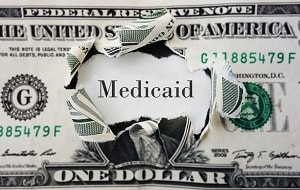Can Florida use my Social Security to Repay my Spouse’s Medicaid Coverage

When a couple applies for Medicaid benefits for only one spouse, the other spouse might wonder if their personal income and assets are in jeopardy as well. For example, a spouse who remains in the couple’s home might wonder if Florida’s Medicaid system might go after the remaining spouse’s Social Security income to pay for the other spouse’s assisted living arrangements.
Spousal Protection
Medicaid has rules that protect couples where one spouse is getting Medicaid benefits and the other is not. Under these spousal protection rules, many of the couple’s assets are protected from Medicaid’s estate recovery process. In each state, there is a concerted effort to not leave the spouse who did not get Medicaid destitute and homeless. While there are slight variations to these rules from state-to-state, their general outlines are the same throughout the country.
Assets
Each state has what is called a community spouse resource allowance (CSRA), with the community spouse being the one who did not get Medicaid benefits. In 2018, the federal government set the national CSRA maximum limit at $123,600.00 and the minimum at $24,720.00. This means that no state can allow community spouses to keep more than $123,600,00 in assets, but they cannot set the minimum any lower than $24,720.00. In all states, the family home is a protected asset that Medicaid will not touch.
Income
Spousal protection says that the community spouse may keep all of their own income, no matter the source of that income. Each state also has its own minimum monthly maintenance needs allowance (MMMNA) which is the level the community spouse’s income must meet to be considered not destitute. If the community spouse’s income does not meet the minimum level of income for that state, then the community spouse is entitled to an MMMNA from their deceased spouse’s income. Each state has its own minimum and maximum amounts for MMMNA.
In short, not only are community spouses allowed to keep their own incomes after their spouse ho was on Medicaid passes away, the community spouse might be entitled to a portion of the deceased spouse’s income to bring their own income up to an state-acceptable level.
Medicaid estate recovery is a complicated process that can be very frustrating. The Mattar Firm’s Medicaid lawyers know how to handle the process and how to make sure that you keep the income your are entitled to, and you get the extra income you are entitled to from your deceased spouse’s estate and have it protected from Medicaid.
